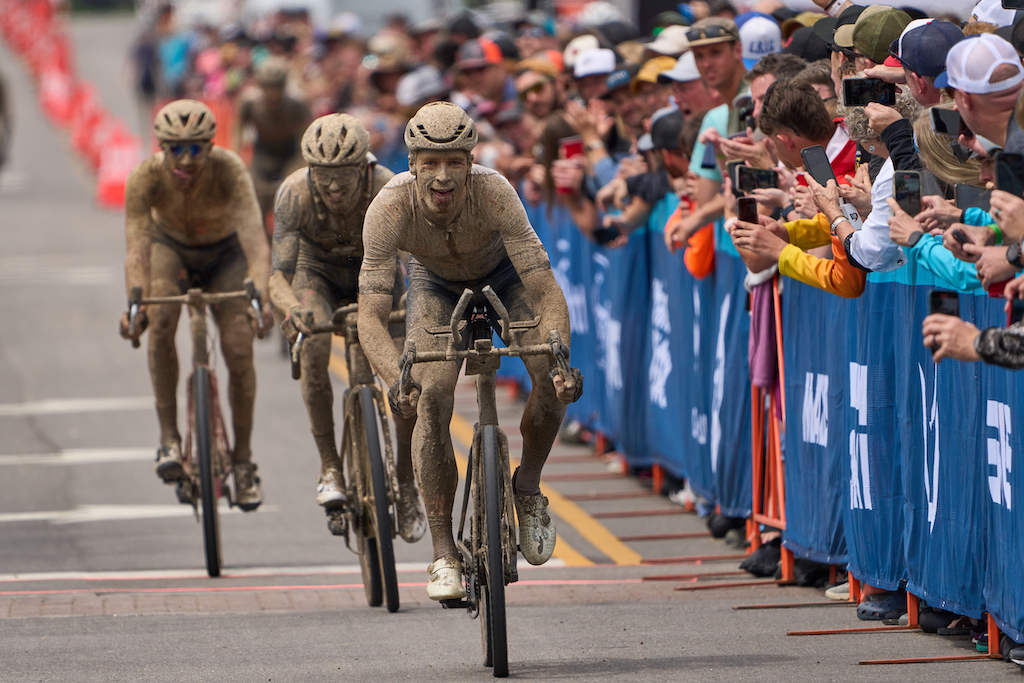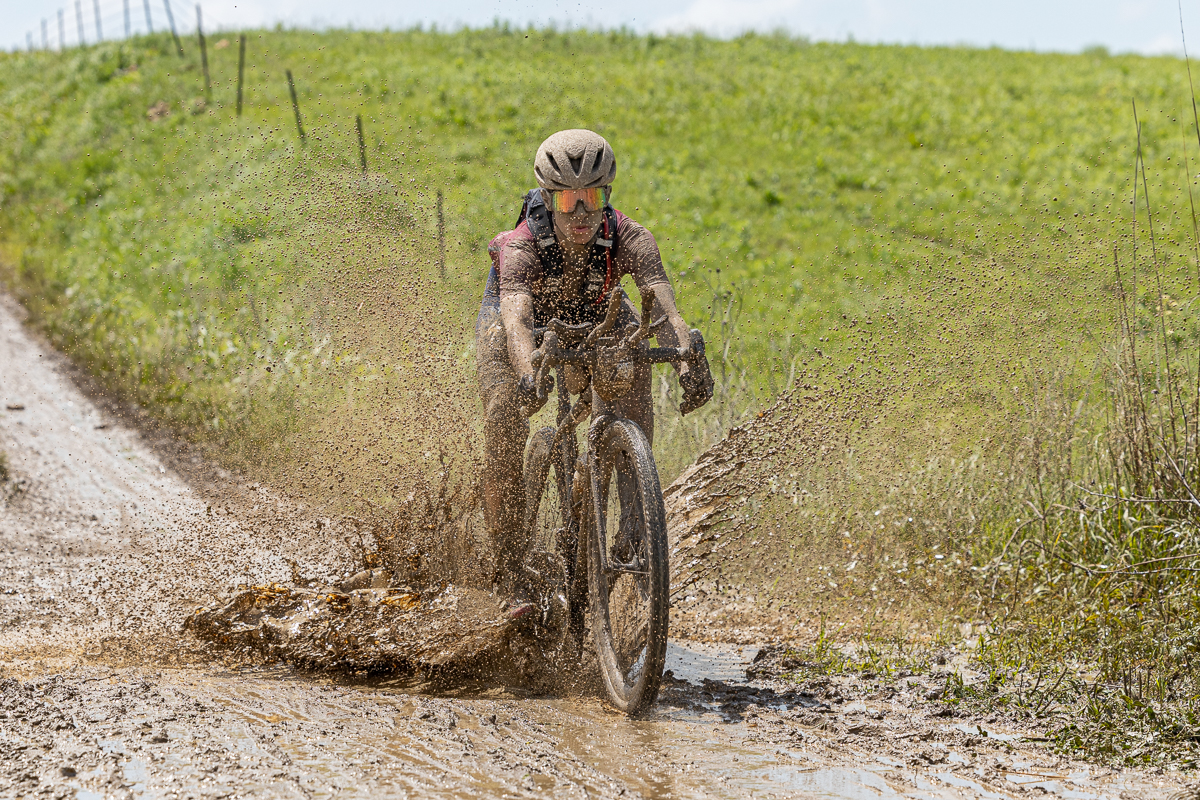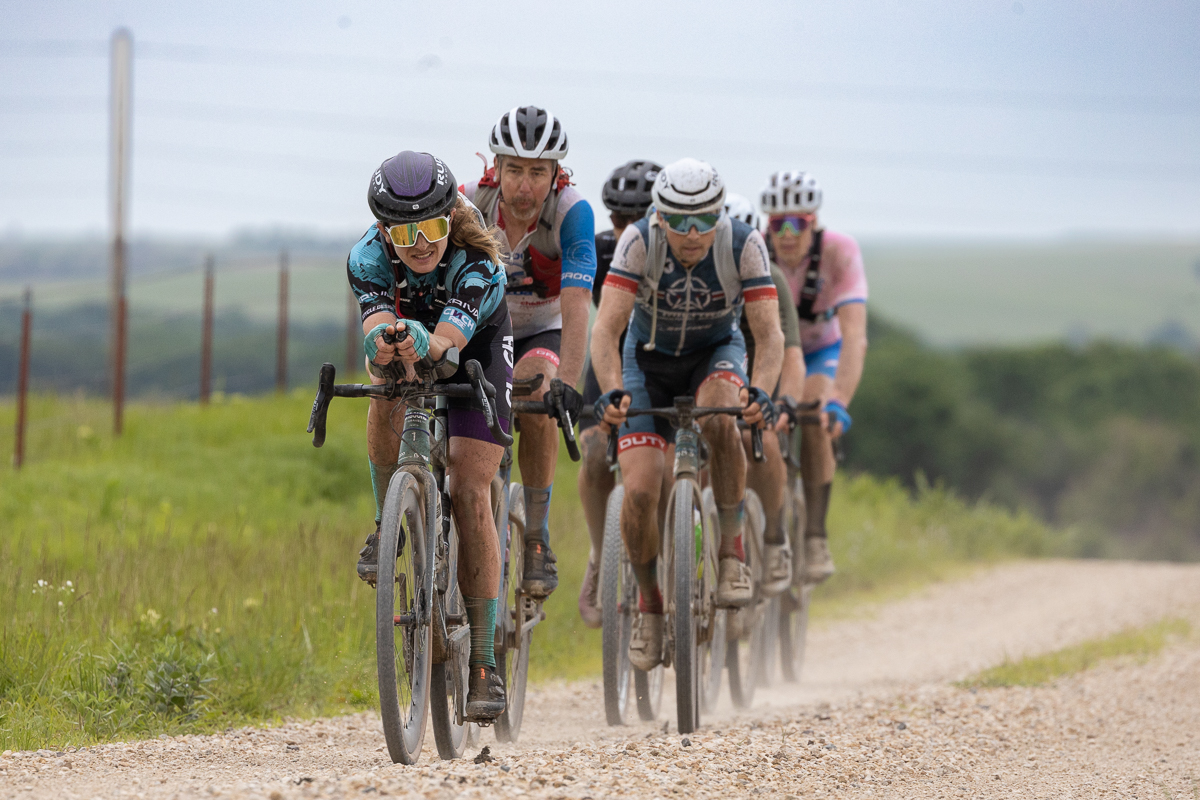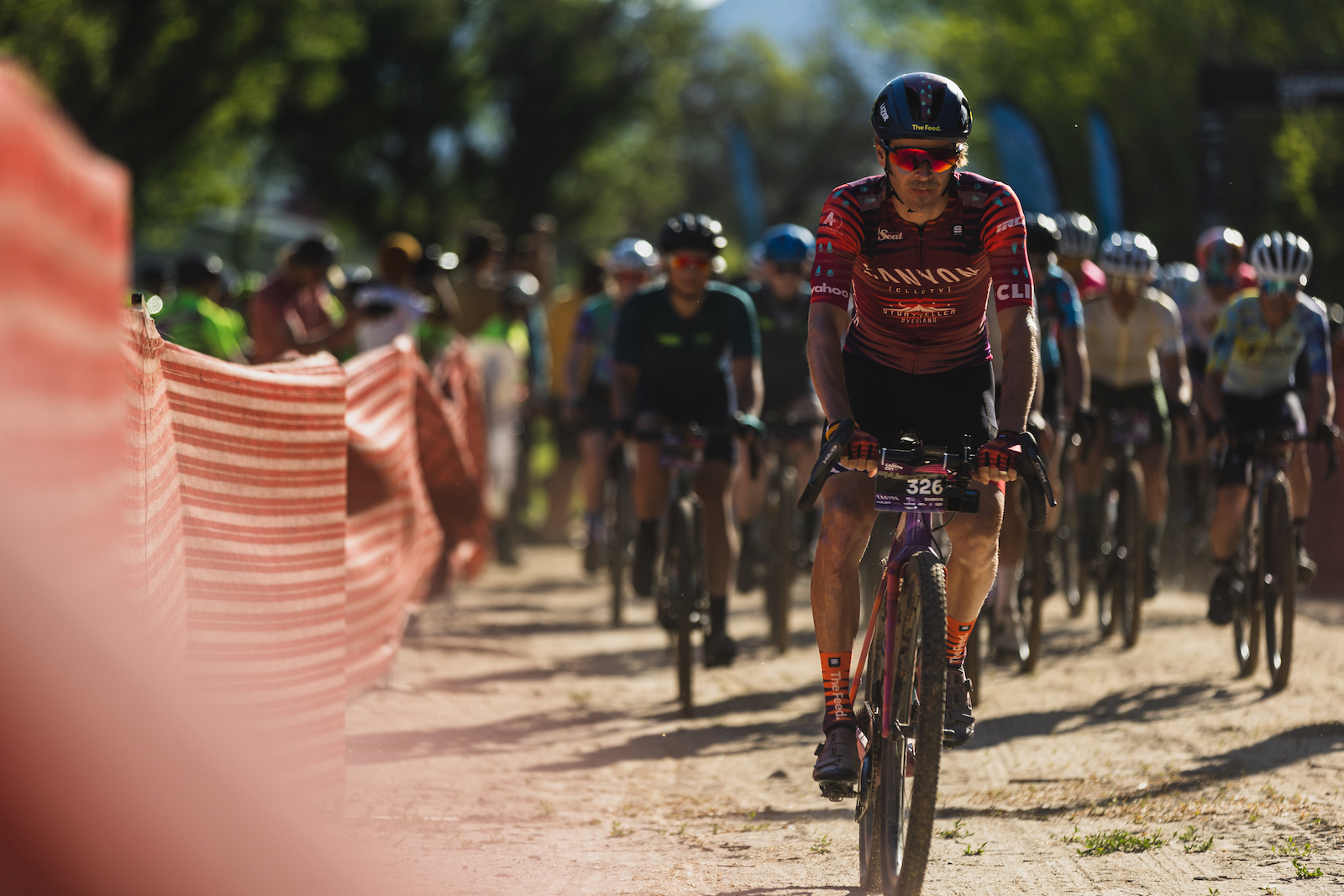
The use of aero bars in gravel racing has been a highly-debated, hot-button topic in recent years, with professional racers weighing a range of concerns versus benefits across some of the biggest events in the United States.
A new rule banning them in the elite categories at Unbound Gravel could have caused another uproar. However, Cyclingnews found out that many of the discipline's key contenders in the pro ranks are moving away from the idea of tradition and comfort of aero bars in long-distance gravel riding, and are now in agreement with the rule for the elite fields.
The riders have cited some of the main advantages of banning aero bars, which include lighter bikes, increased safety, clearer boundaries, less confusion and tension, fairer racing, and even "looking cooler" or "less silly" as some of the reasons to say good riddance to aero bars among the elites at Unbound.
Unbound Gravel organizers' new rule that removes aero bars from the elite categories stipulates, "No aero bars, bar extensions, or clip-on attachments of any kinds will be permitted."
The two most surprising riders who are in agreement with the new ban on aero bars at the event in the elite categories are defending champions Ivar Slik and Sofía Gómez Villafañe. Both riders used aero bars when they won the men's and women's titles, respectively, in last year's edition of Unbound Gravel 200.
"I am happy with the ban on aero bars for the pro riders at this year's Unbound. Last year, I rode Indeed with aero bars, but I don't think the outcome would change if I rode without them. I'm happy that the rules are now clear, and I don't think it will affect the way the event will be raced this year because it's the same for everyone," Slik told Cyclingnews.
"Of course, it gives you a significant aerodynamic advantage if you're in the time trial position and at some parts of the course, it's more comfortable. On the other hand, it has some disadvantages like more weight, and it's less aerodynamic when you have aero bars, but you are not using them, and in last year's race, I used them for approximately 15% of the race, because I was never in a group of fewer than four riders, and so then you don't ride much in the time trial position."
In addition, last year, Slik won the race on a sponsored Wilier Rave SLR with a one-piece Filante SLR cockpit and 3D-printed custom mounts to allow for Profile Design aero bars to be fitted to the aero handlebars.
He told Cyclingnews that he chose to use aero bars last year because, in previous years, the event was more of a solo effort with larger time gaps as a result. However, he said the popular and fast-growing off-road discipline now sees more groups riding together, especially among the elites.
"Last year, and also this year, the level of the riders field has increased, and it's more level, so groups stay longer together, and it's hard to break away. Ten days before last year's race, there was a discussion between riders to ride without aero bars, but I spoke out clearly that I would ride with aero bars because Wilier and I invested a lot of time in developing and producing custom aero bars and in my opinion, you can't change rules on such a short term," Slik said.
"I don't agree with the argument that aero bars are more dangerous when riding in a group because you are not in the time trial position when riding in a group, and we can all handle our bikes. With the argument that aero bars are not looking cool, I partly agree. For me, it's also looking lame to ride with aero bars but riding with a CamelBak also looks not cool, but you have to in such a long and challenging race like Unbound."
'Not a key component' says Gómez Villafañe

The discussion reached a boiling point last year when favourites among the elite men's category attempted to reach a collective agreement for those planning on riding in the front pack not to use aero bars.
Gómez Villafañe said that she now agrees with the new rule for elites not to use aero bars at Unbound Gravel. However, she reiterated that the approach to the conversation taken among a handful of racers in the men's category, in what she called a 'gentleman's agreement,' could have been handled better because they didn't hear the voices, concerns or opinions of the women who were competing.
"I am excited that the organizers are not allowing the pros to use aero bars, as I do think that our bikes looked extremely silly last year. The aero bars were not necessarily a key component of my performance last year, but I did enjoy using them as I actually found them to be quite comfortable," Gómez Villafañe said.
"I was extremely upset last year at the men for trying to ban them for the entire pro field in the few days leading up to the event because; you do not try to change the rules this close to the start line and, most importantly, they failed to include the women in their conversation, which is what really ticked me off.
"The men play such a key role in how the women's race plays out, and it bothered me that they would try to impose a rule into our race without including us in the conversation."
Gómez Villafañe said that she connect with organisers, Life Time, directly about a potential ban on aero bars for the elites and to help them gather information from the professional field with which to make a decision on the new rules. She said she also spoke with the organisers about her concerns regarding the media at gravel events, course markings, and prize purses.
'Smart decision' says Nauman

Amanda Nauman, a two-time winner of Unbound Gravel 200 in 2015 and 2016, told Cyclingnews that last year that safety was a major concern of hers when it came to the use of aero bars in the 100-mile and 200-mile events.
She felt that, at that time, the decision for the men to try and "self-police" wasn't going to work because the rules needed to come from someone who has authority. Therefore, she was relieved to learn that organizers have banned them among the elites, calling it a "smart decision."
"Last year, I saw photos of some women racing in their aero bars early on in the race, in a group setting, which made me cringe, because that is the reason why organizers would ban this because they are not safe riding in groups. I think they realized that the risk versus reward, especially for the elite field, was too high," Nauman said, who has also raced the 350-mile XL event and this year will race in the 100-mile event.
She also noted the organizers' decision to start the elite men and women riders separately and with earlier starts from the mass of amateur riders.
"There were so many stories of people crashing early on in the race last year that also probably influenced the decision to spread out the start times and ban the aero bars. Eliminating those two things, from a safety position, the hectic-ness, it's better. They prioritized the safety angle this year, which is nice," Nauman said.
"Two races at the front have different standards, now, so once Unbound and Lifetime made the decision to accept the fact that they have an elite race within this event, then they were OK with giving it its own rules."
Nauman also believes that, when it comes right down to the issue of advantage, aero bars were not the deciding factor.
"How long you spend at a checkpoint could be a bigger difference than whether you use aero bars," she said. "When it comes down to physics, sure, they offer an advantage, but will they determine the outcome? I don't think so, I think they are just one part of the larger puzzle of racing for 200 miles in Kansas."
Lauren De Crescenzo, winner of Unbound Gravel 200 in 2021, said she was also happy that she won't be using aero bars during the long adventure in the Flint Hills this year.
"Aero bar clip-ons on a gravel bike are the most uncomfortable way to ride over rough gravel terrain. Aero bars make the bike handle differently, climb sluggishly, and it’s harder on the lower back when riding such long distances. I’m looking forward to riding Unbound in a more comfortable position this year."
Likewise, Ian Boswell, winner of Unbound Gravel 200 in 2021, said, "I never loved riding a time trial bike, so when I left the road, I wasn't going to ride a time trial bike, so why add bars to my gravel bike? Plus, I don't think it's wise to do group riding in time trial bars. As much as people want no rules in gravel, rules help make things clear. When you lack consensus, guidelines help."
'A collective sigh of relief' says Stetina

Peter Stetina told Cyclingnews that the general consensus among the elite men and women racers was a collective sigh of relief coming into the racing season where Unbound Gravel is one of the biggest events on the calendar.
"A decision is made for us so we can focus on the race and have clear boundaries to play within," Stetina said.
He said he understood the use of aero bars from a historical perspective of Unbound Gravel, which was rooted in long 15-hour-plus riding, whereby athletes spent the majority of that time alone, and they offered both comfort and help while riding against the elements.
"Now you look at the front pack, and there's a group of 50 [riders] rolling late into the day, and it is predominantly road race tactics. We, in the front, don't need the help of aero bars. I think it's unnecessary, and I think it just makes it for a better sporting event [not to have aero bars]," Stetina said.
"I really applaud that the organizers made that call because there would always be infighting within the pros. So, I'm glad that there's a change."
Stetina said he believes aero bars do offer an energy-saving benefit to riders because of the sheer distance of the events offered at Unbound Gravel. However, he felt that benefits were unnecessary, and they ended up causing tensions among the riders in the race, and that many organizers are now doing away with traditional rules and banning aero bars.
"It's not extremely hilly, so the weight penalty is minimal. And, yeah, it is a benefit. But I think it's an unnecessary benefit. And what was happening was it was becoming an arms race on who had the most technical time trial cockpit in a mass-start race. It just doesn’t fit," he said.
"I used aero bars in two of my three Unbounds. I want, as much as anyone, just a fair fight and a good gravel race, and Unbound is part of that. I don't think it is a controversy now that the rule is there. I think that was a big ‘thing’ because there was infighting because there was no rule. And there were so many very strong opinions on which I've been on both sides over the years.
"I think the biggest takeaway from the rule change is that it was a massive sigh of relief among all the professionals that with this is the rule, you don't have to worry about it anymore, we have a set of standards. I applaud Life Time for that," Stetina added.
"It’s really just some of the more traditional Midwest races where that tradition still lives on. I would say 80% of the races I do now, aero bars are not allowed."







